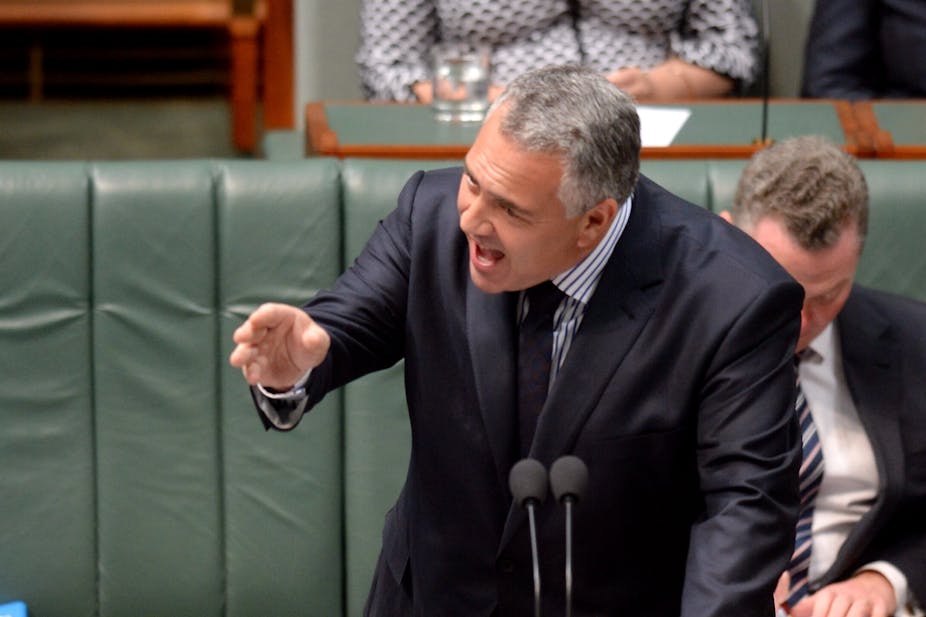Bludgers are back, and with them their traditional sparring partners, the battlers. The welfare changes in the Abbott government’s first budget have created fierce debate.
On the side of the government, Andrew Bolt wants to “separate the battlers from the bludgers” and end the “culture of welfare”.
Others, like Mission Australia CEO Catherine Yeomans and Labor’s Anthony Albanese, claim there are very few dole bludgers. They say the vast majority of unemployed “really do want to work” and demonising our most vulnerable can only add insult to injury.
While it may seem strange, within neoliberal philosophy all welfare recipients are “bludgers” and all taxpayers are “battlers”. The government’s proposed welfare changes are not an example of “character assassination”. They represent an assassination of entitlement.

Efforts to prove there are more “deserving” than “undeserving” welfare recipients will do little to counteract the proposed changes. Treasurer Joe Hockey is philosophically committed to reducing the welfare state to restore taxpayers’ rights. He believes taxpayers should not have to foot the bill for another person’s livelihood, particularly if that livelihood comes from pensions or other transfer payments.
The term “dole bludger”, in fact, was invented in the 1970s to help explain this philosophical position, which we now call neoliberalism. The result is that “dole bludger” has a very specific meaning in Australia, one that stems less from concerns about work ethics or “deserving” versus “undeserving” poor than from a view that the welfare state is, itself, illegitimate.
Australia’s long history of bludgers
In Australia as in the UK and America, the term “bludger” was originally used to describe a prostitute’s pimp, chiefly due to the pimp’s weapon of choice - a bludgeon. Other forms of the word bludger draw their connotation from this meaning, in essence describing the “exploiter” in a relationship of economic exploitation. The prostitute in relation to her bludger was termed a “battler”.
The relationship between the bludger and the battler, while transposed from about 1900 onwards to apply to wider economic categories, has maintained its original meaning. The bludger extracts financial benefit from a worker, but the battler who is coercively bound to this relationship “battles on” for financial survival.
Within Australia, other uses of the term bludger have maintained this meaning. Until 1974, radical left-wing workers used the term to describe bosses. The boss extracts a portion of the value produced by the worker, placing him within the role of bludger while the worker becomes the battler. This application owes a lot to Marxist theory, but we have neoliberal philosophers to thank for the dole bludger.
Inventing the dole bludger
As Keynes fell out of favour around the time of the 1974 stagflation, Australians began looking elsewhere for ideas. Stagflation describes times when inflation and unemployment are both high. Policies designed to improve one problem often worsen the other.
American neoliberal economists like Milton Friedman blamed welfare for the economic crisis, while philosophers like Robert Nozick argued “taxation is theft” and the receipt of welfare the appropriation of stolen goods.
Australian think tank the Institute for Public Affairs agreed. John Singleton co-developed a political party around the idea, and the Coalition had a growing number of adherents. Among them, future minister for immigration John Hodges likened welfare recipients to “shoplifters” and urged Australian taxpayers to view themselves as “victims of crime”. The philosophy is fairly complicated, so instead of explaining it, newspapers started to refer to welfare recipients “bludging” on “taxpayers”.

The terms “dole” and “bludger” seem like natural partners today, but the two words weren’t even used in the same sentence until 1974 when Victorian Liberal premier Rupert Hamer made the connection, urging the government to “tighten controls against bludgers on unemployment benefit”.
Everyone knew what the term “bludger” meant. It meant someone (like a pimp or a boss) who made an income from someone else’s labours. The taxpayer fitted neatly into the role of the battler so anyone who paid tax, including Australia’s richest, could regard themselves as “battlers” in relation to the welfare “bludger”.
Talking at cross-purposes
As shadow treasurer in 2012, Joe Hockey promised to end “the age of entitlement”. His first budget as treasurer launched headlong into that project. Changes to Newstart Allowance for under 30s, such as time-limited payments, pose perhaps the most extreme challenge to entitlement in Australia’s post-Depression history.
Hockey himself has expressed little concern about the work ethic of Newstart claimants. Time after time we’ve heard him say the welfare state is the problem, not its beneficiaries. When Hockey says things like “ … a cleaner, a plumber or a teacher is working over one month full-time each year just to pay for the welfare of another Australian. Is this fair?”, he is questioning the tax-transfer system, not the “moral fibre” of the claimant.
People who argue that welfare recipients are, by and large, “legitimate claimants” may be talking at cross-purposes. What they should really be arguing for is the legitimacy of the welfare state.

